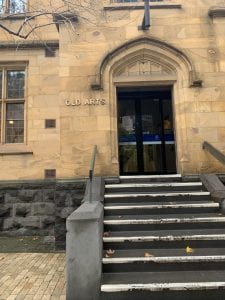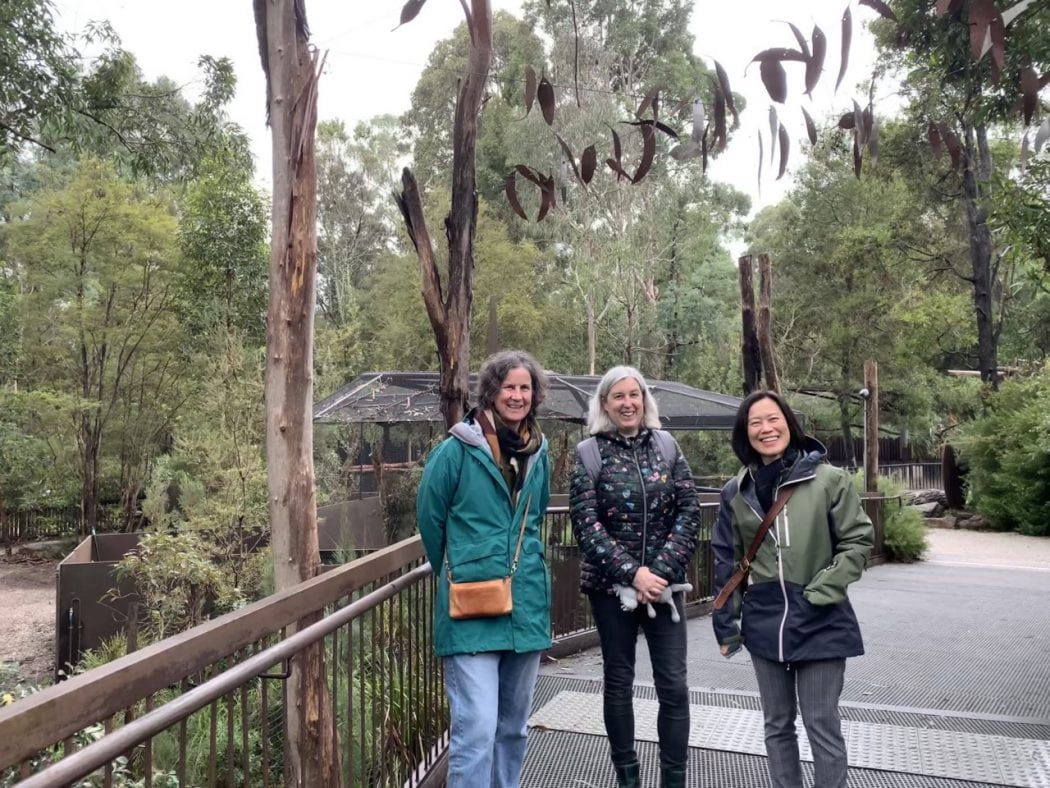
Symposium – Transcription in Legal Contexts: Problems and Solutions
In the last month (June 8 and 9, 2022), the Hub ran a symposium called Transcription in Legal Contexts: Problems and Solutions. Day 1 was all about problems, while Day 2 was about solutions. We ran this event on campus at The University of Melbourne, and also had online attendees including many from the U.K (who braved a 5am start to match our 2pm!), as well as New Zealand, and some from other parts of Australia. We thank everyone for coming, and for talking and engaging with us on this topic. You can see our list of attendees at the bottom of this blog post.
Two of our attendees who made the flight over from England – Dr. Robbie Love (pictured) and Dr. Kate Haworth (whose image is featured at the top of this post). Along with David Wright, Robbie recently did a study looking at how eight different transcribers approach the same indistinct audio, he talked about this on the second day of the symposium. You can read our summary of this work in another blog post where we summarised Love & Wright 2021, and you can also read the written version of their excellent paper here.
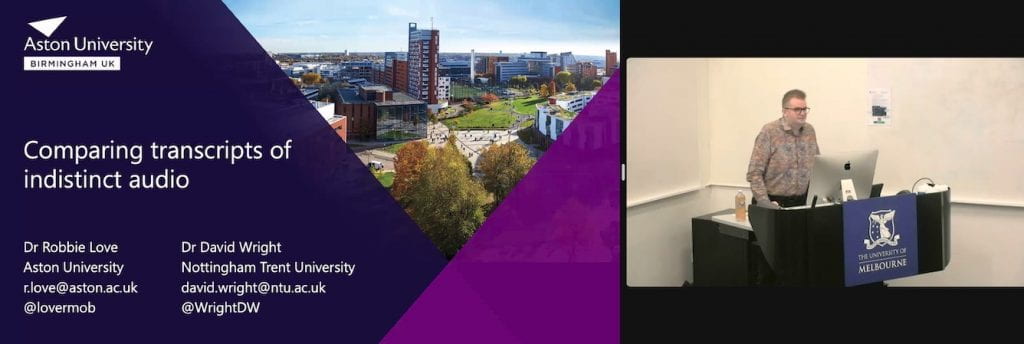
On the first day of the symposium, there were many interesting talks where problems surrounding transcription in legal contexts were outlined. Talks on the first day were:
Kate Haworth – Problems with transcripts of police interviews
Yuko Kinoshita – Problems with transcripts of covert recordings
Miranda Lai – Problems with translations of covert recordings
Laura Smith-Khan – Problems with transcripts of LOTEs
Alex Bowen – Problems with transcripts of body-worn video
George Brown – Problems with attributing utterances to speakers
We had some discussion about these problems during the Symposium, both during the event (and especially in “open-mic” sessions on the second day) as well at our symposium dinner at Blue Train on Southbank in Melbourne. It was too bad our online attendees could not join us there as well!
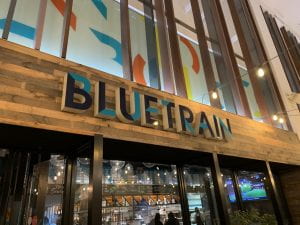
On the second day, where solutions were discussed in detail, we also had Robbie’s talk as well as a Hub presentation given by Helen and me, where we outlined some of the ways we are working towards a better way of approaching the transcription of indistinct audio. Helen has a paper soon to be published called A framework for deciding how to create and evaluate transcripts for forensic and other purposes – she talked about this at the Symposium, and also linked together many of the themes across the two days. See here for Fraser (2022) – paper to appear very soon. Please note that a number of symposium attendees (including me!) have published in the special issue of Frontiers that Helen’s paper will also appear in.
During the second day of the Symposium, we had also set aside time for reflection and discussion of phonetic issues, and Kirsty McDougall, George Brown and James Tompkinson contributed to this in particular. Reflection and discussion of legal issues was largely handled in a presentation by Elyse Methven from UTS.
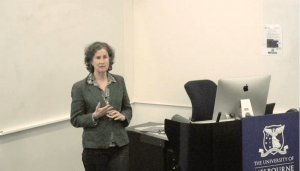
We will be working to maintain some of the great connections we made during the symposium, and also follow up on ideas for collaboration. Thanks again to all our attendees for bringing our event to life!
Symposium Attendees
In person
Dr Kate Haworth (Aston) – transcription of police interviews
Dr Robbie Love (Aston) – corpus linguistics; transcription of poor quality audio
Dr Yuko Kinoshita (ANU) – forensic speaker comparison; effect of transcript on perception of poor quality audio
Dr Elyse Methven (UTS) – law; forensic linguistics
Alex Bowen (UoM) – law; forensic linguistics; transcripts of body-worn video footage
Dr Miranda Lai (RMIT) – interpreting and translation; use of ‘transcripts’ (really translations) of audio featuring speech in languages other than English
A/Prof Ute Knoch (UoM) language testing
Dr David Deterding (formerly Brunei, now adjunct at Latrobe) phonetics
Prof John Gibbons (Monash) Forensic linguistics
Dr Ikuko Nakane (UoM) Japanese sociolinguistics; Forensic linguistics
Dr. Sunyoung Oh (UoM) Korean studies; translation (also see this previous blog post)
Students:
Eleanor Kettle (UNE) linguistics
Elhan Uzun (RMIT) interpreting and translation
Online
Prof Diana Eades (UNE) forensic linguistics; Aboriginal English
Dr Laura Smith-Khan (UTS) law; forensic linguistics
A/Prof Ester Leung (UoM) translation of court transcripts in Hong Kong
Dr Michael Cooke (independent) – interpreting/translation; Aboriginal languages
Dr Emma Richardson (Aston) police interviews
Dr Felicity Deamer (Aston) police interviews
Dr James Tompkinson (Aston) forensic phonetics
Dr Georgina Brown (Lancaster) forensic phonetics
Dr Kirsty McDougall (Cambridge) forensic phonetics
Dr Jesin James (Auckland) engineering and speech science
Prof Paul Foulkes (York) sociophonetics; forensic phonetics
Students:
Lauren Harrington (York) – forensic transcription
Acknowledgements
We were able to run this event thanks to generous support from the School of Languages and Linguistics (in particular, the head of School Investment Fund).
